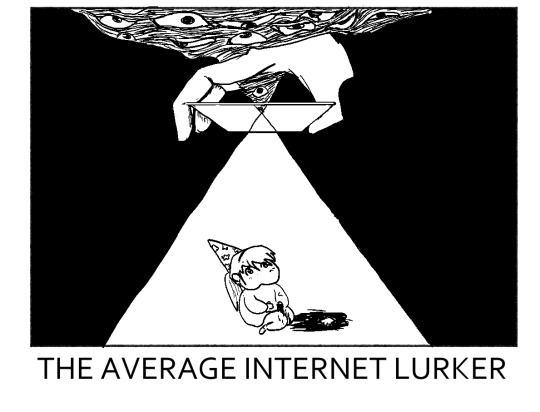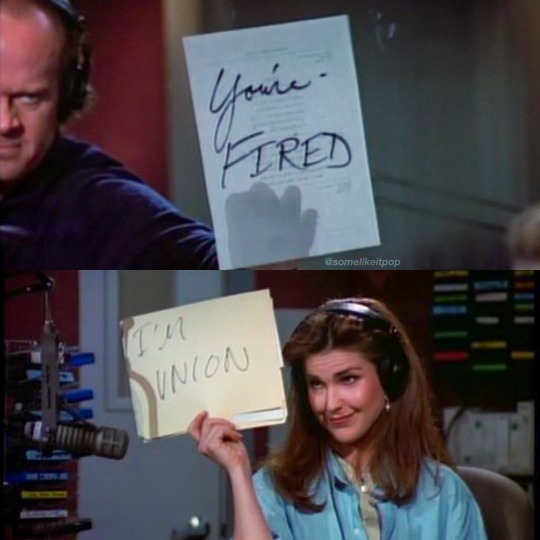Photo


posting is body horror and lurking is cosmic horror, it is quite simple
twitter
18K notes
·
View notes
Text
one time i walked into God’s room when He wasn’t expecting me and He was kneeling by the foot of His bed praying. tf. who was He praying to ..?
11K notes
·
View notes
Text
hi im triple AAA game studio. Welcome to our game gunshitters 7. this is a 70$ USD game that is not finished but you can buy the DLC at launch for 50$USD. also theres a seprate in game currency where you can spend 200$USD to get diamonds to buy cosmetics. look at our roadmap. dont you want to pay 30$ for our first season pass? you will unlock special epic gear that will never ever come back so you can get a nice healthy dose of FOMO. the next season pass is next month and is also 30$. also we are locking 40% of the entire game behind our fun new feature 'present mechanics' so you can gift the rest of the game to yourself for the low low price of 40$ and you also get an epic gun skin if you pay for the GOLD season pass for 60$. also you know how the game was unfinished at launch? oh haha were sorry about that. were releasing it now but you need to pay 20$ for it. fuck you. fuck you. fuck you.
guy in a duplex living off of nothing but bread with a computer from 2009: hi everyone im so sorry im late to announce this but my game honeydew mayhem where you can conquer the universe as a bee is gonna release a month late because i still need time to work on making sure that everything works properly and i also need to make sure that the free content updates i will release over time for the next 10 years will be on their way. i need to make sure that you can do absolutely everything you can think of in this game and i still need to polish 20 boss fights and finalize 40 more in-game areas to explore. im sorry you guys will have to wait a bit longer. also my game will be 25$ i hope that isnt too much to ask. if it is i promise it will go on sale soon for 9$. i love all of you and hope you are having a good day
48K notes
·
View notes
Text
Seven Swords Against Difficult Problems
When Alexander the conquering king came to Gordium, he heard the legend of the Gordian Knot, which no one could untie. Whoever could separate the ox-cart Gordias had tied to its post, should rule all of Asia; and Alexander, ambitious and cunning, thought for a long time on the problem. Finally, he arose and went to the marketplace where the cart was tied, unsheathed his sharp word, and cut it in half with a single stroke. From Gordium, his armies marched as far as India, fulfilling the prophecy of the oracles.
The first sword, which is the key to all others: In the real world, the constraints of the problem as presented are often not the same as the actual constraints you must labor under.
* * *
When Alexander the conquering king came to Gordium, he heard the legend of the Gordian Knot, which no one could untie. Whoever could separate Gordias’ ox-cart from the post it was tied to, should be a mighty king indeed, and Alexander very much desired power and glory. After thinking for a long time, he arose and went to the marketplace, and approached the knot. He drew his sharp sword; but a wise old priest in the crowd, seeing this, cried, “Halt!”
“What is it?” Alexander asked.
“Do you propose to cut the knot, and in so doing, fulfill the prophecy?”
“I do,” said Alexander.
“But that’s not right,” the priest said. “The prophecy isn’t ‘whoever separates the ox-cart from the post, by whatever means they choose, will be king of all Asia.’ Perhaps you’ve been misled by the Greek translation, which is λύω, λύειν, and can mean either ‘untie’ or simply ‘separate.’ But the original prophecy was in Phrygian, and there the distinction is quite clear: the knot must be untied, not merely cut.”
Alexander looked at the knot. It was tied of a rope made of cornel-bark, and very old; and such was its age that it had rotted and frayed, and years of exposure to the rain and sun had wetted and dried it again, until it was all a single hardened mass of organic matter. It was not even really a rope anymore.
“I doubt that it can be untied. It hardly qualifies as a knot anymore.”
“Nonetheless, untied it must be.”
“And if I do cut the knot?”
“The prophecy is void, your kingdom will fail, and you die alone in the desert and be eaten by wild dogs.”
“That’s in the prophecy?”
“It’s in the commentaries, which are considered extremely reliable.”
Alexander thought about this for a moment; then he shoved the old priest aside, cut the knot with his sword, and went on to conquer all of Asia in defiance of both the prophecy and its commentaries.
The second sword: Metaphysically perfect methods are no virtue, if they cannot in fact yield benefit. Metaphysically imperfect methods are no vice, if they yield the desired aim.
* * *
When Alexander the benevolent prince came to Gordium, he found in the marketplace there some beggars; and moved by pity at their state, he enquired among some of the townsfolk as to how these unhappy persons came to their condition in life. “It the same sad old tale,” the townsfolk answered, “the same vicious cycle that occurs in many places, but which we call here the Gordian Knot, for it is so difficult to untangle. They are unrighteous souls, mired in poverty by their own bad decisions; but though we have offered them virtuous paths out of that poverty–welfare programs with a work requirement, sober living facilities with a curfew, and other ways they can become productive members of society–they either disdain them, or when their desperation finally drives them to try, they fail, and return to their previous state. We can do nothing to help them.”
Alexander was puzzled by this. “Tell me, sir,” he said, turning to a well-dressed man next to him. “Are you sober?”
“At the moment, or generally?”
“Generally, I mean.”
“Well, no.”
He turned to a woman on his other side.
“Do you observe a curfew?”
“Of course not,” the woman said. “But then, I’m a productive member of society.”
He turned to a third person.
“Have your bad choices ever led you astray?”
“Perhaps,” the third person said.
“And did you suffer the consequences?”
“For a time,” they admitted, “until my friends came to my aid.”
“Yet no one here will be a friend to these beggars.”
“Look,” said one of the townsfolk, “we’re not heartless. We want to help. But we want to be sure our charity isn’t wasted on the undeserving.”
Alexander thought about this for a little while. Then he went to the marketplace, gave all the money he had on him to the indigents there, and told his personal assistant to write as many checks as his accounts would bear, to ensure that at least for a time each would have a place to live and food to eat and clothes to wear, whatever happened.
“But,” the townsfolk said to him, “aren’t you worried your money will go to waste?”
“It seems to me,” Alexander said, “that the surest way to turn an undeserving wretch into a deserving one is not to set them up to fail. I note that all the help you have offered the beggars of Gordium is conditional on them behaving in ways more austere and virtuous than you would ever impose on yourselves. And on top of that, none of you have to deal with even a small part of the hardship that these beggars do; so if you cannot aspire to the virtue you demand of them, even in your comfortable lives, how can you say that this demand for great virtue on their part in order to be worthy of your help is fair? Better to give help without conditions, in the hopes that at least some part of the cycle will be broken, than to give help that is no help really at all.
“And even if in the end their condition returns to what it was before, they shall have had warm beds and hot food tonight, and that is not nothing.”
The third sword: No kindness at all is wasted. No compassion is useless.
* * *
When Alexander the thoughtful prince came to Gordium, he inquired after the history of that place, for he knew that by the careful study of history, the wise prince better understands the forces that shape a realm in the present day. He learned from the governing priests that lately the city was in a great malaise; for its spiritual life was in decline, its lords tried in vain to revive the piety of the people, and there was a general decadence and falling-off of virtue among the people.
“When I came to this city, I saw many beggars,” said Alexander.
“Yes,” said the priests, “for there are those who disdain hard work, and will only beg for their living now.”
“And when passed by the workshops and factories, I saw laborers grumbling about bad wages, and precarious positions.”
“Yes,” said the priests, “for they have lost all respect for authority.”
“Perhaps,” said Alexander. “But would feeding the beggars, and looking to the health of Gordium’s industry, and attending to the needs of the city’s body not do much to alleviate her ills?”
“But nothing to alleviate the ills of her spirit,” said the priests, “for which prayer and piety are the only answer.”
“Perhaps, perhaps,” said Alexander, bemused. “But maybe it is easier to be pious when your belly is full, and your livelihood is not imperiled.”
The fourth sword: Let the question 'but what are the material implications?’ be your most ardent refrain.
* * *
When Alexander the thoughtful prince came to Gordium, he inquired after the history of that place, for he knew that by the careful study of history, the wise prince better understands the forces that shape a realm in the present day. He learned from the governing priests that lately the city was in a great malaise; for its spiritual life was in decline, its lords tried in vain to revive the piety of the people, and there was a general decadence and falling-off of virtue among the people.
“Yet when I came to this city, I passed no beggars in the marketplace,” Alexander said.
“The city is wealthy, it is true; but its heart is sterile,” said the priests.
“And I saw many happy youths in Gordium’s parks and gardens.”
“But they have turned away from the gods, for their parents have not taught them piety,” said the priests.
“And the laborers in the workshops and factories were content; and Gordium is safe from all her enemies.”
“But we are a pale shadow of the city we once were, when our hearts were filled with devotion.”
“Do you see any remedy for this situation?” Alexander asked.
“Perhaps not, for the people will not suffer anything to upset the status quo–but maybe some great calamity will intervene, and our people will be shaken out of their complacency. Then the youths might learn the virtues of patriotism and service, of fighting for their homeland; then in privation, the people might learn the meaning of sacrifice. Then the virtues might be cultivated that would be necessary to make Gordium once again a moral place.”
“Let me get this straight,” Alexander said carefully. “Your people are prosperous and content and they bring their children up in safety; they yearn, perhaps, for a metaphysical fulfillment which is sadly absent in the present age–but the thing they seem to have obtained in exchange for this is a life superior in all other respects. And you believe the comparatively happy remedy to this circumstance would be war, ruin, famine, and terror?”
The fifth sword: As for those matters which are purely metaphysical–you may safely permit the gods attend to them on their own time.
* * *
When Alexander the thoughtful prince came to Gordium, he heard there was a legend that once, there were many scholars gathered there to debate a difficult question, which they called in honor of their meeting-place the Gordian Knot. The question was this: how best does a society promote freedom for its citizens? They discussed many matters that seemed related to this question to them: free enterprise, and free markets, and the freedom to enter contracts; free speech; universal suffrage; and bills of rights. In the end, they produced a new constitution for the entire realm of Phrygia, which was intended to give every person within its borders complete freedom and equality under the law; and the state reserved for itself only those powers necessary to defend that constitution.
When the notables of Gordium told him this, Alexander was puzzled. “But I passed many beggars as I entered the market-place today,” he said.
“We do not claim our realm is a utopia,” the gathered notables said. “Only that here, we are very free. A beggar may still vote in Gordium; they have the perfect freedom to become a minister in government–if they are able.”
“Has that ever happened?”
“Well… no,” admitted the notables.
“And when I passed by the city’s workshops and factories,” Alexander said, “it seemed to me that there were many workers who worked long hours and grumbled about their wages, who were very discontent with their jobs.”
“It’s true,” the notables said. “There are those who barely make a living wage here. But they can choose different and better jobs–if they can find them.”
“Do such jobs exist?”
“We’re not sure,” the notables admitted. “But even the lowest worker may become a wealthy capitalist–if they are able.”
“Has that ever happened?”
“It is rare, but it has happened.”
“And what is this I hear about your rival realm to the west, Lydia, that you despise?”
“Oh, there a man is not free!” said the notables. “Their constitution is wicked; the rights of property are contingent, the rights of employees to enter into free employment contracts are hampered, for the kinds of contract permitted are regulated by the state. Taxes are onerous, for private charity is scorned, and they attempt to provide all necessities at the expense of the wealthy.”
“I just passed through Lydia. They are a democracy like you, are they not?”
“They are.”
“Lydia has wealthy men and women?”
“Oh yes, many. They are not as wealthy as in Phrygia, though.”
“And they seem to have many fewer beggars.”
“That… may be so,” the notables said. “But it comes at a great cost.”
“And the benefits employers provide are better in Lydia. And workers have a say in how their workshops and factories are run.”
“It is a cruel limit to freedom.”
“And a man in Lydia was just telling me that because of government assistance, he was able to take some time off work and go back to college to get his degree. He expected to earn more when he returned as a result. Does this happen often in Phrygia?”
“Only if you can afford the time off, and pay for college. But it’s an incentive to work hard.”
“It seems to me,” said Alexander, “that here in Phrygia, one has many rights, but one must be very wealthy or very lucky to use them. Perhaps in Lydia, one has fewer rights–but the rights which one actually has the opportunity to exercise are far greater. It must seem to the Lydians that they are far freer than the Phrygians.”
“It is not so,” the notables said.
“Maybe–if you are a wealthy or powerful Phrygian. Or if you aspire to be. But there are few of those, and many ordinary Lydians who consider themselves very free.”
The sixth sword: The usefulness of a definition is contingent on the circumstances in which it is applied.
* * *
When Alexander came to Gordium, as in each other city he visited, he made it his habit to speak to both its noble and downtrodden citizens alike. In those days in Gordium, there were the Mark-Bearers, so called for they were born with a serpentine shape on their forehead, which resembled a knotted cord of cornel-bark. They were considered cursed by the gods, and were expelled from their families; and they dwelt apart, at the edge of the city. They were not permitted to vote, to own property, to marry, or to hold office; and if a child without the sign of the knot was born to them, it was taken away as soon as it was discovered.
Alexander went among the mark-bearers and spoke to them as friends; and they welcomed him. “We are pleased you have come, noble prince,” they said to him; “Perhaps you can help us convince the people of Gordium to end their oppression of us.”
“What shall I say to them?” asked Alexander.
The mark-bearers debated among themselves for a little while, then said to him, “We think you should say this: by the careful study of natural philosophy, we have determined both that the sign of the knot is a harmless genetic feature, a mere quirk of melanin which appears on the forehead owing to a benign gene; and it cannot be removed, whether by prayer or washing; and therefore it is unjust that we should be considered unclean and outcast; for this is a property we cannot change, and with which we were fated to be born.”
But Alexander was aghast at this. “Have the markless among which you live so poisoned your perception of yourselves, that these are your paramount arguments: We cannot change it; and, it is innate? Had a wicked sorcerer come to Gordium in the night and, contriving to create dissension among the people, arbitrarily marked every twentieth soul with the sign of the knot–would then your suffering be deserved? If you had tattooed yourselves, as a sign of your fraternal association, but in no other way changed your behavior toward your fellow human beings–would you then be unclean and wicked?
Those of you who bear this mark deserve not to be scorned and shunned by your fellows, not because this is a condition from which you cannot escape–though that may be true–but because there is no evil to them in it; because their prejudice is cruel and unreasonable in itself, not because your humanity is a thing to be justified to them.”
The seventh sword: Who you are, whether that can be changed, whether that should be changed, whether it is natural, and whether you deserve to be treated humanely, are each distinct questions. And the answer to the last one is always 'yes.’
2K notes
·
View notes
Text






Stabbed! A short comic
made for an anthology awhile ago
45K notes
·
View notes
Text
sakura uses the clow wand to hit a badminton birdie (cr 球场NPC羊)
8K notes
·
View notes
Text

Found in drafts. Was I cooking or loosing my mind after 4 years no chapters.
7K notes
·
View notes






















